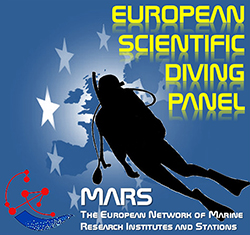THE EUROPEAN SCIENTIFIC DIVER (ESD) | to AESD standards|to the Advanced European Scientific Diver minimum competency
A European Scientific Diver is a diver capable of acting as a member of a scientific diving team. He/she may attain this level by either a course or by in-field training and experience under suitable supervision or by a combination of these two methods.
The ESD must:
- Show proof of basic theoretical knowledge and a basic understanding of:
- Diving physics and physiology, the causes and effects of diving related illnesses and disorders and their management.
- The specific problems associated with diving to and beyond 20m, calculations of air requirements, correct use of decompression tables.
- Equipment, including personal dive computers and guidelines as to their safe use.
- Emergency procedures and diving casualty management.
- Principles of dive planning.
- Legal aspects and responsibilities relevant to scientific diving in Europe and elsewhere.
- Be fully competent with/in:
- Diving first aid, including cardio-pulmonary resuscitation (CPR) and oxygen administration to diving casualties.
- SCUBA rescue techniques and management of casualties.
- The use and user maintenance of appropriate SCUBA diving equipment.
- Be fully competent with:
- Search methods.
- Survey methods, both surface and sub-surface, capable of accurately locating and marking objects and sites.
- The basic use of airbags and airlifts for controlled lifts, excavations and sampling.
- Basic rigging and rope work, including the construction and deployment of transacts and search grids.
- Underwater navigation methods using suitable techniques.
- Recording techniques.
- Acting as surface tender for a roped diver.
- Sampling techniques appropriate to the scientific discipline being pursued.
- Show proof of having undertaken 70 open water dives, to include a minimum of:
- 20 dives with a scientific task of work supervised by a recognized research institution, such as listed above.
- 15 dives deeper than 15m of which of 5 dives deeper than 25m
- 12 dives in the last 12 months, including at least 6 with a scientific task of work.
All evidence must be recorded in nationally acceptable logs, countersigned by suitably qualified persons. None of the above precludes the possible requirement for a practical or theoretical demonstration of any or all of the points shown.
